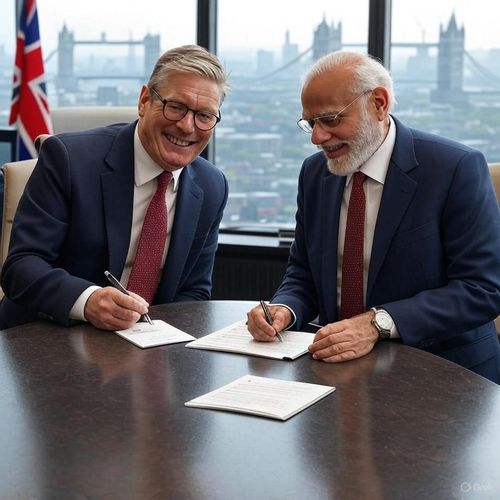UK Firms Expand into Indian Market, Reaping Millions in Exports

Sarah J
Posted on Sun, Mar 2, 2025
Share the article with your network
The UK's tech and life sciences sectors are making significant strides in the Indian market, with recent expansions amounting to tens of millions of pounds for the UK economy. This growth comes as the UK government relaunches talks on a trade deal with India, aiming to create more opportunities for UK businesses and boost economic growth.
Economic Impact and Trade Statistics
In the 12 months leading up to September 2024, UK businesses exported a total of £17 billion in goods and services to India. This figure underscores the importance of the Indian market for UK companies, especially considering India's projected rise to become the fourth largest importer by 2035.
Key Sectors and Companies
Several UK firms have successfully expanded their operations in India:
- Radio Design: This Shipley-based manufacturer of RF solutions for mobile networks, defense, and aerospace markets has established a manufacturing facility in India.
- Marcus Evans Group: The London-based event specialist has set up global tech operations in Mumbai.
- Appliansys: Based in Coventry, this tech company has partnered with Tata Motors to develop an internet-based education pilot for nearly 5,000 Indian schools.
- Microfresh: The Leicester-based chemicals company has implemented its smart antimicrobial technology across multiple Indian textile and leather players.
- Novocuris: This London-headquartered digital health tech business has begun operations in multiple Indian hospitals.
- Biocomposites: Based in Keele, the company is supplying Indian hospitals with medical devices for complex bone, joint, and musculoskeletal infections.
- Optibiotix Health: The York-based business has entered a long-term partnership with Morepen Laboratories to introduce its patented SlimBiome product to the Indian market.
- REM3DY Health: This Birmingham-based advanced manufacturing business has partnered with a leading Indian pharmacy giant to bring innovative gummy vitamin products to India.
Practical Steps for UK Startups Entering the Indian Market
- Market Research: Conduct thorough research on the Indian market, focusing on your specific industry and potential competitors.
- Identify Local Partners: Look for reliable Indian partners or distributors who understand the local market dynamics.
- Understand Regulations: Familiarize yourself with Indian business regulations, tax laws, and import/export procedures.
- Adapt Products/Services: Tailor your offerings to meet the specific needs and preferences of Indian consumers.
- Leverage Government Support: Utilize resources and support provided by UK government agencies for international expansion.
- Attend Trade Shows: Participate in relevant trade shows and business events in India to network and showcase your products/services.
- Develop a Local Presence: Consider setting up a local office or manufacturing facility to better serve the Indian market.
- Protect Intellectual Property: Ensure your intellectual property is properly protected in India.
- Build Cultural Understanding: Invest time in understanding Indian business culture and etiquette to build strong relationships.
- Start Small and Scale: Begin with a pilot project or limited market entry, then scale up operations based on initial success and learnings.
The success of these UK firms in India demonstrates the potential for growth and expansion in this rapidly developing market. As the UK government continues to work towards a trade deal with India, more opportunities are likely to arise for UK startups and established businesses alike. By following these practical steps and learning from the experiences of successful companies, UK firms can position themselves to capitalize on the vast potential of the Indian market.
https://www.gov.uk/government/news/uk-firms-rake-in-tens-of-millions-in-expo
You may also like
Team S
Wed, Jul 30, 2025
US-India’s Game-Changing Satellite Launch: Unlocking Earth’s Hidden Secrets

Team S
Wed, Jul 30, 2025
Temasek Nets 10-Fold Gain with S$8.2 Billion Stake Sale in Schneider Electric India

Sarah J
Thu, Jul 24, 2025
UK and India seal Free Trade Agreement Signed in London
